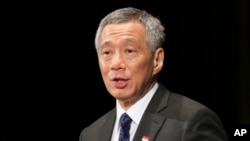Despite rising nationalist sentiment in the South China Sea region, Singapore Prime Minister Lee Hsien Loong said he thinks a growing regional interdependence will prevent any maritime conflicts from occurring.
Speaking Tuesday at the Washington-based Council on Foreign Relations, Lee said the Asia-Pacific region is changing, especially with a rising China.
He said other countries are becoming stronger and their interactions have become more intense in the past 10 years, as trade and people movements grow.
But, with such interaction, he said, come more friction points, such as territorial disputes in the South China Sea.
"None of the Southeast Asian countries want to have a fight with China. In fact, China, too, goes considerably out of its way to develop friendly relations with ASEAN (Association of Southeast Asian Nations),” Lee said.
“But, there is this issue of the territorial and maritime disputes,” he added. “It is not easy to resolve because of another factor that has changed in the past 10 years, because nationalism has become a stronger sentiment and a stronger factor in influencing governments.”
Lee said this is particularity true in Japan and China.
South China Sea
He said China maintains that its historic claims on most of the South China Sea precede international law and this has to be recognized.
"I’m not a lawyer, so I presume there is some plausibility in that argument. But, from the point of view of a country which must survive in an international system, where there are big countries and small and outcomes cannot be determined just by might is right, I think international law must have a big weight in how disputes are resolved,” Lee said.
Lee suggested China follow the example of another big power, the United States, in generally abiding by international law.
He said if China can reach that position, it will have made a great achievement.
Historically, Lee said, China knows that other big powers that have risen by the use of might, such as Spain, Portugal, Nazi Germany, the Soviet Union and the British Empire, have all fallen.
He said China is trying to avoid making the same mistake.
Lee said that while China is successfully transforming its economy, it still has not figured out what he calls social management maintaining social harmony while finding ways to engage the population and its demand for a greater say.
But, Lee said he is confident Chinese leaders are committed to the path of reform.
Japan relations
Nearly 70 years after the end of World War II, Lee said its time for Japan to turn the page on the war, insisting that it must improve relations with South Korea and China.
Lee said unless Japan can put WWII behind it, including the issues of comfort women, aggression and “whether bad things were done during the war, I think this is going to be a continuing sore” for Japan.
They must work with China and South Korea to heal, he said.
Lee, who is in Washington this week, said the United States and Singapore signed a free-trade agreement 10 years ago.
He said he was optimistic that negotiations leading to the 12-nation Trans Pacific Partnership free-trade pact are nearly complete. He called the TPP a key component of the Obama administration’s rebalance toward the Asia-Pacific region.




